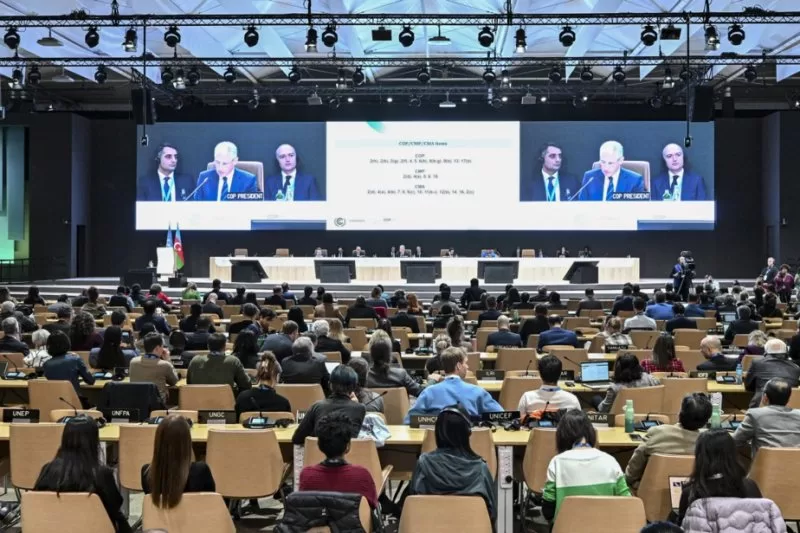Negotiators at the COP29 climate conference reached an agreement on a financing deal for poor nations bearing the brunt of climate change on Sunday, two days after the conference was scheduled to adjourn in Baku, Azerbaijan. Photo by COP29 Azerbaijan/EPA-EFE
Nov. 23 (UPI) — United Nations climate negotiators agreed on a funding formula to help developing countries cope with the effects of climate change early Sunday in Azerbaijan after two weeks of intense negotiations.
In a compromise reached after the COP29 climate conference in Baku ran well past its Friday adjournment deadline, wealthy countries pledged to provide at least $300 billion a year to the global fight against climate change, the UN announced.
The agreement sets an overall climate financing target to reach at least $1.3 trillion by 2035.
Developing countries, however, had been seeking more than $1 trillion annually in support. They called the final figure an “insult” which failed to provide sufficient backing for them to deal with the ravages of a rapidly heating climate and to fund their own transitions away from fossil fuels.
At one point on Saturday, delegates from small island states and the least developed countries walked out of the negotiations in protest.
Member nations, meanwhile, also agreed on the rules for a new global carbon market, which would be used to incentivizing countries to reduce emissions and invest in climate-friendly projects through the trading of carbon credits.
The deal comes as scientists have warned that greenhouse gases reached record observed levels in 2023 and are continuing to rise this year. For 16 consecutive months through September, the global mean temperature exceeded anything recorded before 2023, with carbon dioxide, methane and nitrous oxide all setting record-high levels.
On Sunday, UN Secretary-General António Guterres called the financing deal a hopeful sign amid a year “seared by record temperatures and scarred by climate disaster, all as emissions continue to rise.”
“An agreement at COP29 was absolutely essential to keep the 1.5 degree limit alive. And countries have delivered,” he said. “I had hoped for a more ambitious outcome — on both finance and mitigation – to meet the great challenge we face.
“But this agreement provides a base on which to build,” Guterres said, adding that it is now imperative for individual nations to adhere to their fossil fuel phase-out plans.
“The end of the fossil fuel age is an economic inevitability,” he said. “New national plans must accelerate the shift, and help to ensure it comes with justice.”
COP29 President Mukhtar Babayev acknowledged the disappointment of the poorer nations but called the Baku finance goal “the best possible deal we could reach. In a year of geopolitical fragmentation, people doubted that Azerbaijan could deliver. They doubted that everyone could agree. They were wrong on both counts.”
Reactions by some environmental groups to the final $300 billion figure were scathing.
“The world has been let down by this weak climate finance deal,” said WWF Global Climate and Energy Lead and former COP20 President Manuel Pulgar-Vidal. “At this pivotal moment for the planet, this failure threatens to set back global efforts to tackle the climate crisis. And it risks leaving vulnerable communities exposed to an onslaught of escalating climate catastrophes.
“This is a serious blow to climate action, but it must not stall the solutions that are desperately needed around the world.”
“The $300 billion per year committed by 2035 by rich countries at COP29 falls $90 billion short of the amount needed to implement the Paris Agreement,” said Mary Robinson, former president of Ireland and chair of The Elders, a group of world leaders working to address global human rights issues and abuses.
“This is nowhere near enough to support the developing countries that have not caused the climate crisis yet are experiencing its worst impacts. But the intention in the deal to generate at least $1.3 trillion from a wider range of sources is right. This is an investment, not a hand-out.”
COP29, Robinson said, “was weak in transitioning away from fossil fuels. Oil-rich countries must see that their efforts to delay the inevitable will fail. The green energy transition has gained unstoppable momentum, driven by competitive prices and market demand.”

